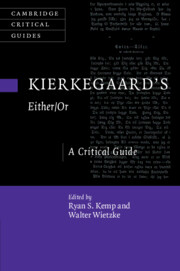Book contents
- Kierkegaard’s Either/Or
- Cambridge Critical Guides
- Kierkegaard’s Either/Or
- Copyright page
- Contents
- Contributors
- Acknowledgments
- Abbreviations
- Introduction
- Chapter 1 Existential Melancholia
- Chapter 2 Don Giovanni and the Musical-Erotic
- Chapter 3 For What May the Aesthete Hope?
- Chapter 4 Companions in Guilt
- Chapter 5 A’s Religion of Boredom
- Chapter 6 The Artist Is Not Present
- Chapter 7 Failed Temporalities in Either/Or
- Chapter 8 Love, Marriage, and Delusion in Either/Or
- Chapter 9 The Philosophy of Science in Either/Or
- Chapter 10 The Despair of Judge William
- Chapter 11 The Problem of Evil in Either/Or
- Chapter 12 Illusions of Ethical Independence
- References
- Index
- Cambridge Critical Guides
Chapter 8 - Love, Marriage, and Delusion in Either/Or
Published online by Cambridge University Press: 16 November 2023
- Kierkegaard’s Either/Or
- Cambridge Critical Guides
- Kierkegaard’s Either/Or
- Copyright page
- Contents
- Contributors
- Acknowledgments
- Abbreviations
- Introduction
- Chapter 1 Existential Melancholia
- Chapter 2 Don Giovanni and the Musical-Erotic
- Chapter 3 For What May the Aesthete Hope?
- Chapter 4 Companions in Guilt
- Chapter 5 A’s Religion of Boredom
- Chapter 6 The Artist Is Not Present
- Chapter 7 Failed Temporalities in Either/Or
- Chapter 8 Love, Marriage, and Delusion in Either/Or
- Chapter 9 The Philosophy of Science in Either/Or
- Chapter 10 The Despair of Judge William
- Chapter 11 The Problem of Evil in Either/Or
- Chapter 12 Illusions of Ethical Independence
- References
- Index
- Cambridge Critical Guides
Summary
This chapter explores Judge William’s argument that ethical marriage is superior to aesthetic ways of living. William’s argument serves as a response to the method A sketches out in his essay on crop rotation, by explaining how the various concerns that motivate A’s program for avoiding boredom are more fully addressed by the marriage relationship. And yet, deeper examination of William’s argument reveals how this view of marriage is itself incomplete. Incidentally, it is A’s review essay on “The First Love” that demonstrates how a proper appreciation for “the occasion” helps protect romantic partners, in both aesthetic and ethical relationships, from falling into delusion about the status of their relationship. William’s account of marriage seems to ignore this problem, but with the importance of the occasion in mind we can understand what a fuller, more meaningful romantic relationship could be like.
- Type
- Chapter
- Information
- Kierkegaard's Either/OrA Critical Guide, pp. 135 - 152Publisher: Cambridge University PressPrint publication year: 2023

